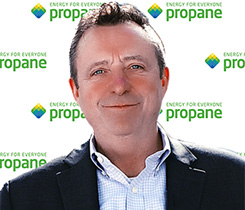Who oversees your marketing?
Marketing is even more important in the retail propane business today than it has been in the recent past. Skyrocketing energy prices, customer conservation, energy switching, global warming and the green movement are a few of the new considerations we didn’t have to think about much just a few years ago. External factors are changing the propane business environment faster than at any time in the history of our industry. If marketing has been on the backburner in your company, you need to move it forward. Do it yourself or delegate marketing to a key employee if you want your propane business to succeed.
 Tom Jaenicke |
Propane retailing is a capital-intense business, and marketers are understandably disciplined in the operations area. Delivery scheduling, truck routing, keeping up with regulatory requirements and safety programs are a few of the things marketers must consider in keeping their business running smoothly from an operations standpoint. However, don’t allow these important operations functions to overshadow the increasing need to market propane successfully to current and prospective customers. Make sure your business allocates sufficient resources, both management time and budget dollars, to create or update your marketing plan and implement a consistent marketing program.
If your company does not have a robust marketing program now, you need to review some marketing basics. Your marketing plan should define your goals, determine your strategy and identify the actions you need to retain profitable customers and attract the right new customers to accelerate your business success. Your marketing plan should also help support a positive image of the propane industry so we can truly be considered an exceptional energy.
Marketing plans can be as simple or as complex as they need to be to match the goals you set for the business. Start with a SWOT analysis of your business. SWOT = Strengths, Weaknesses, Opportunities, Threats. What are your business strengths? What do you do well? Identify your weaknesses. You may choose to remain weak in some areas that are not integral to your business success or your marketing plan may include improvements in those areas. What are the opportunities in your marketplace and which ones do you want to exploit? What are threats to your business? Those threats can come in the form of propane competitors or other energy providers who are turning your weaknesses into their opportunities and strengths.
When you complete your SWOT analysis, you will want to establish your business goals. Performing a SWOT analysis by customer segment can help you in that process. Most companies commonly break out customer segments such as residential, industrial, commercial, motor fuel and agriculture. Some companies also break out each segment on a profit basis and value rank customers within each segment. These extra steps can be important benchmarks to review as you gain and lose customers over time.
Paula Wilson, director of marketing for AmeriGas, supports this type of customer definition. “It is essential for marketers to understand transaction behavior and define the profitability of each customer segment. This combination allows us to better predict opportunities and connect with customers in organic, meaningful ways,” she said.
Losing high-value customers and gaining only low-value customers will put your business in a downward spiral. Your goals can include customer value gain/loss along with traditional customer gain/loss. Set your business goals to take advantage of your market strengths and the opportunities that match well with those strengths.
Determine a marketing strategy that will enable you to accomplish the goals you have set. Reviewing your strengths will help you to establish that winning strategy. Being the lowest-priced propane retailer in the area is not a winning strategy. Your strategy could be as simple as being the most efficient and dependable supplier of propane to the residential segment of customers in your marketing area or it could be more complex depending on your strengths.
Once the marketing strategy is determined you need to identify the actions necessary to attract the high-value customers in those market segments you have identified with the most opportunities. Some of your actions can be internally focused, such as supporting the installation of a more efficient routing and delivery system by marketing that dependability to your customers and prospects.
Other actions can be focused directly on the customer or prospect, such as creating or updating your Web site, planning a targeted advertising campaign, developing a builder program, implementing online account access and any number of other actions that you have the capacity to accomplish. Knowing what customer segments are most profitable and knowing what type of customers in those segments have the most value will allow you to target your marketing dollars in an efficient manner.
Your most critical step is implementation. No marketing plan can be successful without the enthusiastic support of your employees. You should include employee input in the marketing-planning process and make sure they are familiar with the final plan so they can be strong business allies. Key on what their roles should be to support the marketing plan and offer periodic progress reports for their review. Measuring marketing-goal performance should become a part of the key performance indicators of your business that you are able to share with your employees.
The development or revision of a marketing plan is an annual process that may need to be revisited several times during the year to make adjustments. Marketing planning should start several months before the start of your fiscal year so you can include it in your annual budget. You, as the business owner or general manager, need to devote quality time to develop and implement a marketing plan for your business. If you don’t have time to do it yourself, you need to delegate a qualified employee. Who is your director of marketing?
Tom Jaenicke is the owner and president of ATomiK Creative Solutions, LLC, a company that provides marketing, consumer education and business development consulting, primarily to the propane industry. He can be reached at 810-252-7855 or
tgjaenicke@aol.com.
















